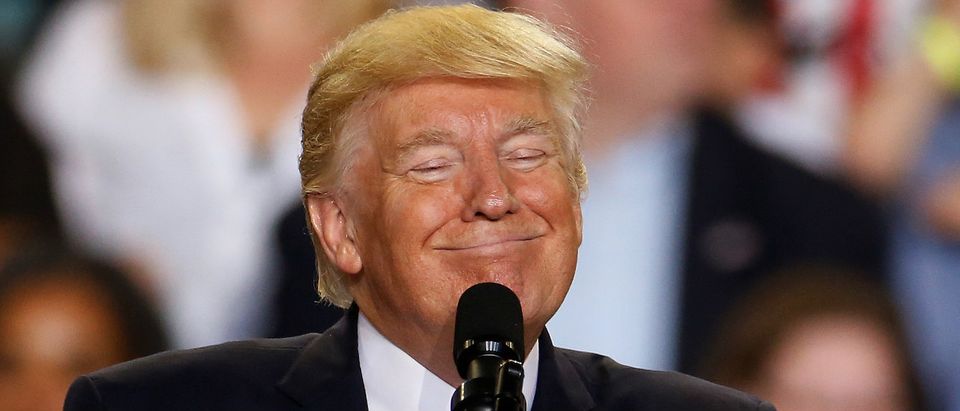In his nearly three years of daily media exposure in the political realm, President Donald Trump has clearly inaugurated a new art form of variously exasperating and infuriating critics by doing what all of us would love to do at many times in our lives: He tells them to go to hell.
Most every human being can relate to the sentiment. Sometimes the desire to tell someone to go to hell stems from anger: The slovenly neighbor’s dog tears up your just-bloomed daffodil bed, for example. You thus invite said unrepentant neighbor to pay a visit to the netherworld. Sometimes, the sentiment is sparked by indignation: You spend weeks preparing a proposal for a lucrative client, but your office counterpart claims the effort — and the new contract — as his. This action prompts you to email your colleague a Google map to hell that directs him much farther south than the Michigan town of the same name.
Feelings of disgust can also be the catalyst for the exhortation, as was the case when President Trump took time during the 2018 State of the Union address to indirectly call out the National Football League for tolerating disrespect for one of our primary, unifying expressions of love for country.
This instance followed President Trump’s now well-known pattern. His invitations to go to hell are typically delivered in the form of tweets or utterances that are less direct in their verbiage if not their intent. Barking “fake news!” at a White House press pool reporter whom the President perceives as misleading could be considered shorthand for “go to hell, you lying journalist.” For that matter, isn’t tweaking “Cryin’ Chuck Schumer” via Twitter merely a veiled suggestion that the intransigent New York senator book a one-way ticket to Sheol?
Let’s grant that in few circumstances outside of snappy movie repartee is it considered politic or productive to direct another to perdition. Let’s also grant that we, the voting public, are adults who should be capable of imbibing the concept that politicians use salty language, particularly given the high stakes with which they are gambling.
While we’re at it, let’s acknowledge that the standard practice of politicians using one vocabulary in front of the cameras and another in closed-door discussions is desperately out of step with our culture’s current demand for authenticity. Being authentic, we’re told, is the key to leadership success. President Trump has, either deliberately or serendipitously, applied this principle to immediate effect during his first year in office.
Who among us has not been compelled to attend a company training session, school board meeting or community forum in which the sanctioned language of communication was “corporate speak”? This insidious gelding of the English language is easily recognizable as the type of discourse that makes some listeners roll their eyes and squirm in their seats—these listeners being the ones who have steadfastly resisted re-education into the new order of jargon madness. They instinctively know what University of California-Berkeley’s Jennifer Chatman once explained about corporate speak: “People use it as a substitute for thinking hard and clearly about their goals and the direction that they want to give others.”
Imagine if President Trump encouraged Americans to adopt the best practice of standing for the national anthem because it is one of our core competencies that empowers us to leverage the impact of shared goals. It sounds smart and avoids controversy because, in point of fact, that language says nothing at all.
President Trump’s typical discourse, by contrast, is refreshingly lacking in gluten-free jargon. It’s gritty. It’s raw. It can be crude. Yet, it’s almost unfailingly authentic and directly traceable to what he believes — sans focus groups, teleprompters and talking points. And this unrefined, untested stream-of-consciousness speaking and tweeting is what endeared tens of millions of voters to candidate Trump. It is also what has won over millions more who voted, perhaps very reluctantly, for a man they weren’t sure they could trust.
Consider, for example, the alternative of Senator Ted Cruz, the runner-up Republican nominee in the 2016 campaign. His incisive, encyclopedic, artisan-crafted prose is aimed with unerring accuracy at the minds of voters. When Cruz speaks, few have any doubts that he has spent his lifetime thinking about what he believes and practicing its defense. You can take Senator Cruz’s speech to the bank. However, it lacks a beat that voters can dance to. In 2016, it was a complex minuet blasted to a crowd that craved the honest simplicity of stripped-down funk.
Some lament that we are living through a time that has seen the “coarsening” of our public discourse. Others with perhaps less delicate sensibilities recognize, whether they will admit it to pollsters or not, that there is a time for flowery, vacuous prose (e.g., the two Obama administrations) and a time for speaking plainly.
In other words, sometimes, circumstances dictate that America requires clarity over convention. Sometimes, indeed, we need a leader who isn’t afraid to tell people to go to hell.
A.J. Krawczyk is a freelance writer and editor living and working in Wisconsin.
The views and opinions expressed in this commentary are those of the author and do not reflect the official position of The Daily Caller.


